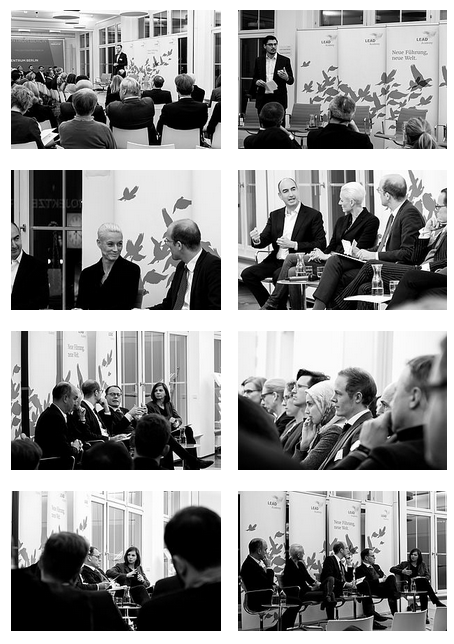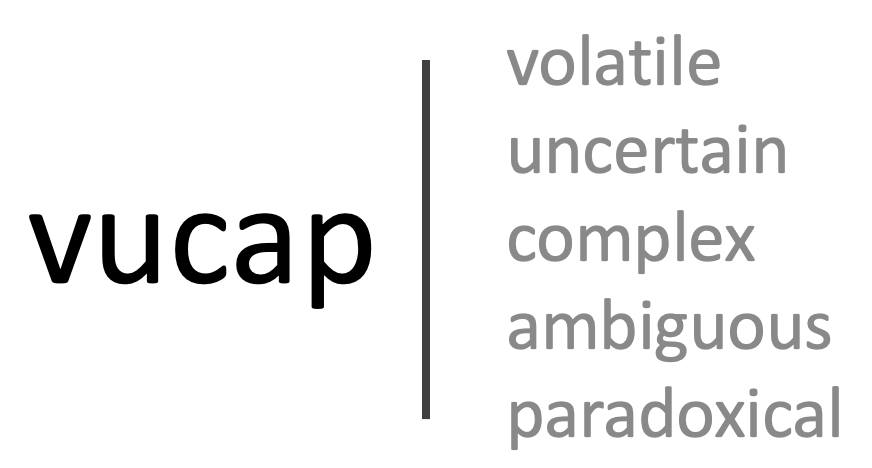Leaders oftentimes depict their situation as what may be summarized with the acronym vucap. Vucap stands for volatility, uncertainty, complexity, ambiguity, and paradox. It is vuca + paradox. While much of what can be resolved, can also be delegated, the essence of leadership may lie in the non-resolvable grey area of vucap. Central to leadership then is the ability to navigate across shades of grey – or shades of vucap.
Video on religion & leadership
In this short video, I present a recent article on religion and leadership published in the Academy of Management Perspectives ‘Faith and Management Symposium August 2019 Issue.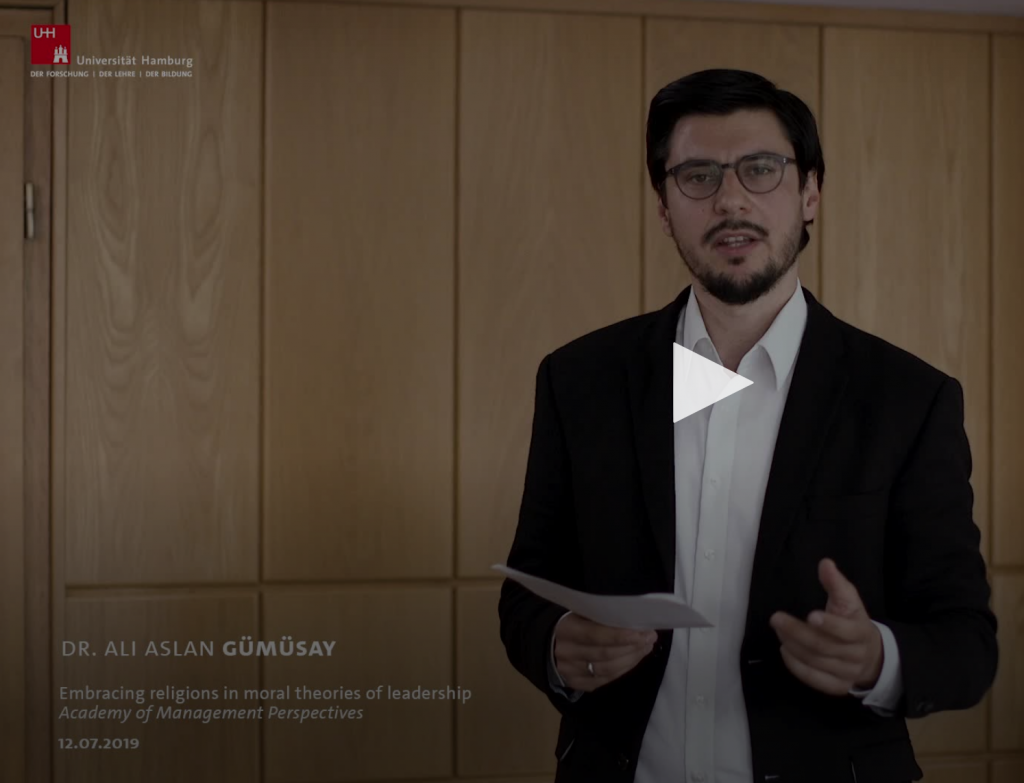
Religions in moral theories of leadership
New article “Embracing religions in moral theories of leadership” published in Academy of Management Perspectives.
Abstract: Religions are social constituents of present 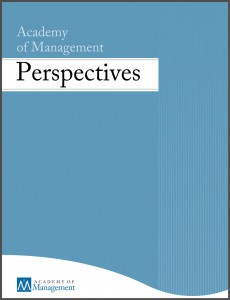 societies that need to be integrated into theories of leadership. In this article, I outline how three distinct characteristics, particularly present in Abrahamic religions, can significantly impact leadership principles and practices: a belief in the existence of and relationship to a God, the faith in and pursuit of a hereafter purpose, and the belief in and attempted adherence to a sacred scripture. Subsequently, I classify two approaches to examine their impact on leadership: a scripture-based and an empirical-based lens. I then highlight how the distinct characteristics can either inform and blend into or transform and modify moral theories of leadership.
societies that need to be integrated into theories of leadership. In this article, I outline how three distinct characteristics, particularly present in Abrahamic religions, can significantly impact leadership principles and practices: a belief in the existence of and relationship to a God, the faith in and pursuit of a hereafter purpose, and the belief in and attempted adherence to a sacred scripture. Subsequently, I classify two approaches to examine their impact on leadership: a scripture-based and an empirical-based lens. I then highlight how the distinct characteristics can either inform and blend into or transform and modify moral theories of leadership.
This figure offers a graphical summary:
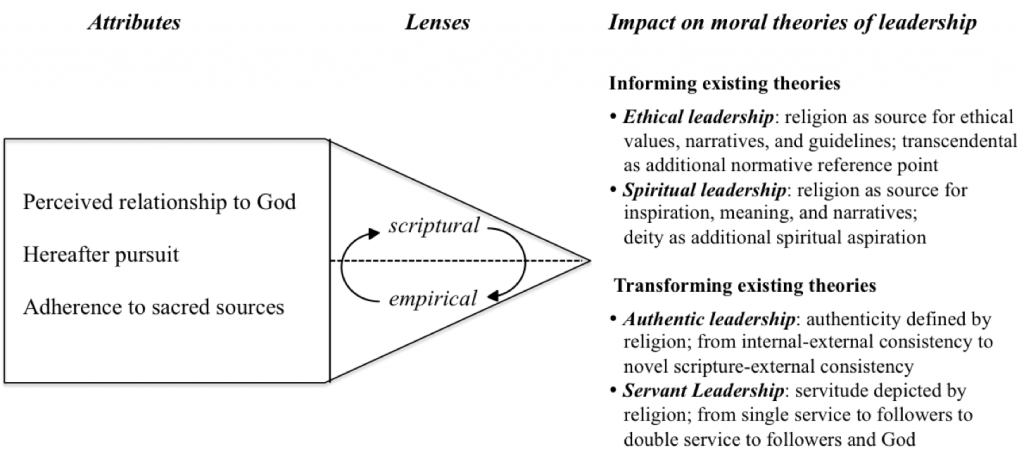
Die Rolle von Religionen in der Wirtschaft
Artikel aus der Zeitschrift Bibel & Liturgie hier zum Download
Die Thematik von Religionen in der Wirtschaft ist heute 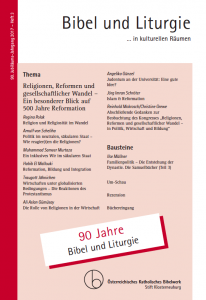 weitestgehend ein Tabu. Über Religion redet man nicht. Man schweigt sich aus. Gleichzeitig werden Spiritualität, Meditation und Yoga salonfähig. Sie versuchen sich als mögliche Alternativen für Sinnstiftung und Orientierung in einer chaotischen und komplexen Welt. Doch das Thema Religion scheint nicht ausgestanden zu sein. Im Gegenteil: Es beherrscht den politischen Diskurs, spaltet Gesellschaften und Gemeinschaften, ist fast omnipräsent in den Medien. (…)
weitestgehend ein Tabu. Über Religion redet man nicht. Man schweigt sich aus. Gleichzeitig werden Spiritualität, Meditation und Yoga salonfähig. Sie versuchen sich als mögliche Alternativen für Sinnstiftung und Orientierung in einer chaotischen und komplexen Welt. Doch das Thema Religion scheint nicht ausgestanden zu sein. Im Gegenteil: Es beherrscht den politischen Diskurs, spaltet Gesellschaften und Gemeinschaften, ist fast omnipräsent in den Medien. (…)
Der Artikel ist wie folgt gegliedert: Zunächst mache ich einen Schwenker in die Wirtschaftswissenschaft, genauer Betriebswirtschaftslehre, und die annähernde religiöse Abstinenz in ihrer Lehre und Forschung. Im Anschluss befasse ich mich mit der Rolle von Religion in der Wirtschaft und werde hier auf zwei Arbeiten von mir als Beispiele eingehen: eine zum Thema Religion und Führung und eine zum Thema Islam und Unternehmertum. Schließlich unterbreite ich einige Vorschläge zum Umgang mit Religion, die sich auf die Praxis, Lehre und Forschung beziehen.
Religion, Politics and Leadership
Federal elections in Germany will take place in a few days on the 24th of September. Around 61.5 million Germans will vote for their political representation in national parliament. For the first time since the end of the Second World War the “Alternative for Germany”, a party that many consider right-wing extremist, is very likely to make it into parliament. With campaign slogans like: “Burka? We prefer bikinis.” it tries to make Islam a divisive issue. A couple of weeks later on the 15th of October, Austria will also elect a new national parliament. The Freedom Party of Austria uses the topic of Islam in its campaign, too. Religion and in particular Islam are recurring issues in political debates.
In the recent TV duel between the two main contenders for German chancellor, the candidates were asked whether they had gone to church in the morning. Both Schulz and Merkel started their sentence with “I was not today…”, to continue with mentioning some religious institutional practices. This followed some social media uproar with many challenging that this kind of question was asked in the first place.
Religion is pervasive, yet elusive
Whether the question was appropriate and useful or not, the reactions show that religion is a contested issue. Pervasive, yet elusive. The largest party in German parliament has the C for Christianity in its name. Angela Merkel is the daughter of a pastor. The former president of Germany, Joachim Gauck, who retired a couple of months ago, is a trained pastor himself. His successor Frank-Walter Steinmeier is a devout Christian, too.
When we look over the Atlantic, we recently witnessed some religious leaders in a group prayer laying hands on Donald Trump reiterating their support. Mike Pence, the Vice-President, is a devout Christian, whose beliefs strongly impact his policy views. Other leaders around the world stress their religiousness and how it impacts their policies and way of life.
More generally, a PEW (2015) study shows that around 6 billion or 84% of the world population is somewhat religiously affiliated. This number is expected to grow both in absolute and relative numbers to over 8 billion or 87% of the world population by 2050. The philosopher Jürgen Habermas (2001) speaks of a “post-secular society” and the theologian Paul Tillich (1957) calls faith an “ultimate concern”. All in all, this highlights that we should not ignore faith, but rather engage with religion both critically and constructively.
Religion – a double-edged sword for leaders
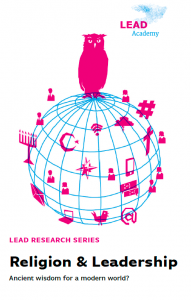 However, we do not know much about how religious beliefs impact leaders. I have zoomed in on this issue in a study with Christian, Jewish and Muslim leaders entitled “Religion & Leadership”. The study illustrates that religion is a double-edged sword that can cause both harm and good in and for leaders and beyond. Potential pitfalls are worldly negligence, non-critical reasoning, exclusivity claim and a belief in divine right. Potential opportunities are personal harmony, deeper meaning, social caring and lived values. If pitfalls are overcome and opportunities embraced, religion can be an anchor and compass for individuals, organizations, and societies in a complex world.
However, we do not know much about how religious beliefs impact leaders. I have zoomed in on this issue in a study with Christian, Jewish and Muslim leaders entitled “Religion & Leadership”. The study illustrates that religion is a double-edged sword that can cause both harm and good in and for leaders and beyond. Potential pitfalls are worldly negligence, non-critical reasoning, exclusivity claim and a belief in divine right. Potential opportunities are personal harmony, deeper meaning, social caring and lived values. If pitfalls are overcome and opportunities embraced, religion can be an anchor and compass for individuals, organizations, and societies in a complex world.
Religion & Leadership
 Ancient Wisdom for a Modern World?
Ancient Wisdom for a Modern World?
Religion is often a taboo. Yet, leaders need to put religion back on the agenda – to take it seriously, to be aware of its pitfalls and opportunities, to be inclusive, and to capture religion as a force for good.
The new study on religion & leadership can be downloaded here. Blogposts about the study are here and here. An article and radio feature (in German) here. Here is a link to an executive education course that builds on study insights.
Pitfalls & opportunities
Religion is a double-edged sword. In the study, I identify four pitfalls and four opportunities for leaders: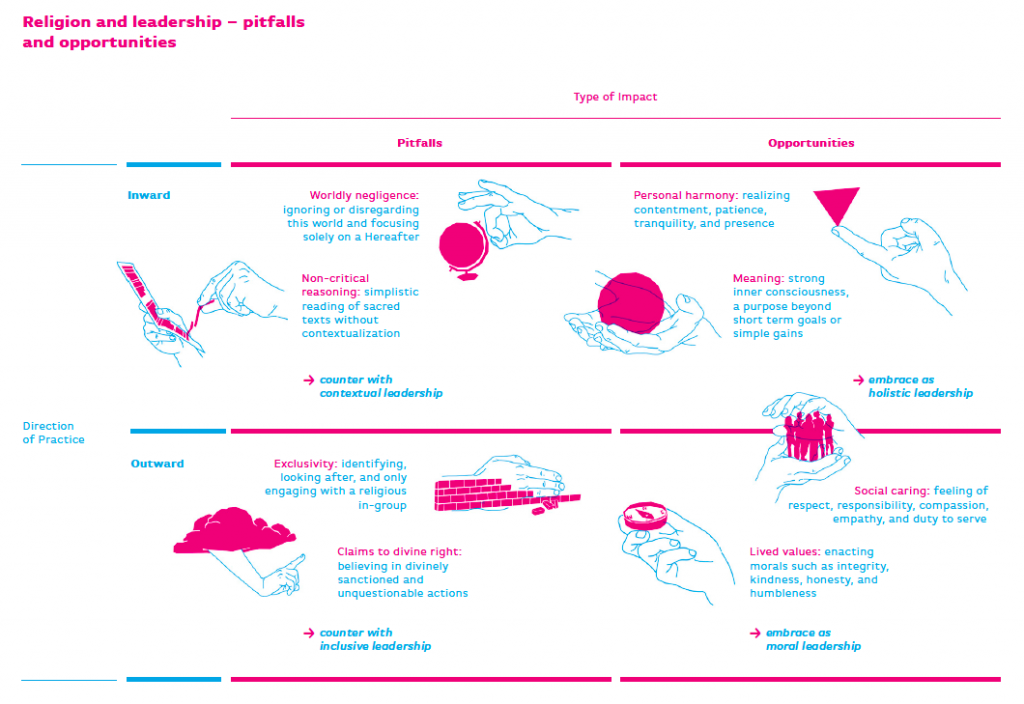 How should leaders engage with religion?
How should leaders engage with religion?
The study suggests five ways forward:
- Take religion seriously
- Harness the power of religion, be wary of its downsides
- If religious, find personal and social balance
- Put religion on the diversity agenda
- Offer room for faith
Impressions from the LEAD launch event